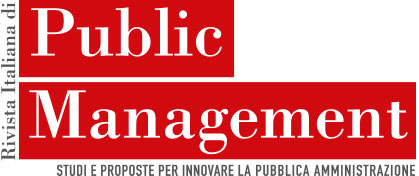Editorial guidelines
Article submission procedure
Authors must send their papers, reporting the code appropriate to the type of contribution (Special Focus Call or Permanent Call), and following the editorial guidelines, to: editors@rivistaitalianadipublicmanagement.it
The e-mail must indicate name and surname, e-mail address, qualification, and the institution the author(s) belong to. The article itself, on the other hand, must contain no element identifying the author(s).
Publication of each paper is dependent upon the judgment of the editorial team, by a double-blind peer review process.
Submitted articles may not be offered at the same time to other publications, nor may they have been previously published (periodicals, blogs, online communication platforms, etc.).
Criteria for publication
The paper’s length varies depending on the type of contribution:
- Authors wishing to take part in the Special Focus Section Call must produce a 10,000-word paper, including tables and figures and not including the bibliography, using the attached template.
- Authors wishing to take part in the Permanent Call for the Dialogues section must produce a 6,000-word paper, including tables and figures and not including the bibliography, using the attached template.
Article layout
For the purposes of submission, it is necessary to use the template which contains the general editing instructions for writing the article. To streamline the process of reviewing the contributions for approval, please follow scrupulously the rules set down in the template and in this section.
To guarantee the uniformity of the papers, and given the content of the periodical’s thematic/scientific area, certain style rules are set out hereunder:
- Spacing
Spaces – never more than one at a time – are to be inserted after and not before punctuation marks. No spaces or tabs are to be entered before headings, paragraphs, and the like. Tabs are to be used only for lists and tables. No spaces are to be inserted between an apostrophe and the following word in cases of elision, or between parentheses or inverted commas and the words they contain, before punctuation marks, or before the percent sign %.
- Uppercase letters
Do not use all caps and, in general, avoid initial caps if not strictly necessary. Leave in lowercase letters the beginning of common words and titles (examples: manager, social services, public administration).
Specific attention is to be given to the use of uppercase and lowercase letters in cases of names of a state and of its bodies, and official names of governmental, juridical, and administrative bodies (examples: “the Italian Republic,” “the Country” when referring to Italy, the “Municipality of Milan,” but regions” or “the municipality” if generic).
- Initials and acronyms
Initials and acronyms are to be written without full stops, and with only uppercase initial letter (e.g..: Asl, Ao, Ssn); initials, like foreign words, have no plural form except essentially “pgs.” The first time initials that are not commonly used are referred to in the text, they should also be written out in full, with the initials in parentheses. Regulatory references are all written in lowercase letters (e.g.: l. 833/1978; legislative decree no. 502/1992).
- Foreign words
Foreign words that have definitively entered use in Italian (budget, marketing, management, etc.) are not to be written in Italics, have no plural form, and show no gender agreement.
- Quotations and quoted passages
When quotations or passages are mentioned, they should be in Italics, separated from the text by a blank line before the beginning and a blank line after the end. Omissions from quoted passages should be indicated by three dots in square brackets, as in the example below: […].
At any rate, quotations are not to exceed five lines in length.
For any doubts as to the editorial guidelines as defined here, or the use of the template, requests for clarification or input should be addressed to the managers of RIPM’s editorial staff (redazione@rivistaitalianadipublicmanagement.it), bringing the case to them.

